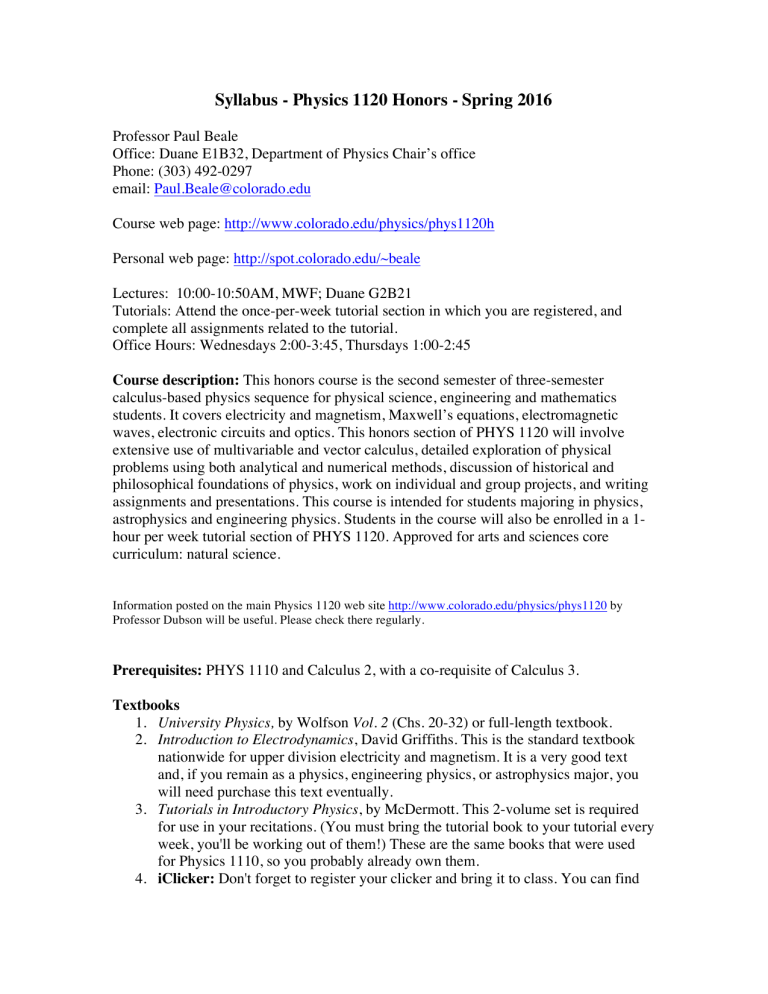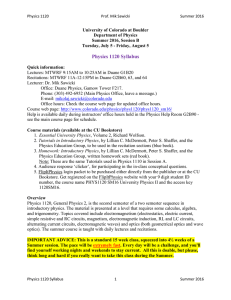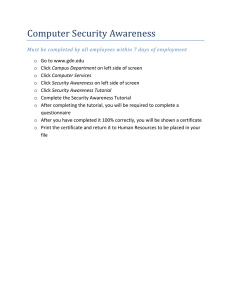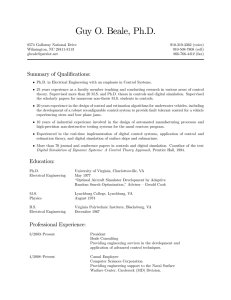Syllabus - Physics 1120 Honors

Syllabus - Physics 1120 Honors - Spring 2016
Professor Paul Beale
Office: Duane E1B32, Department of Physics Chair’s office
Phone: (303) 492-0297 email: Paul.Beale@colorado.edu
Course web page: http://www.colorado.edu/physics/phys1120h
Personal web page: http://spot.colorado.edu/~beale
Lectures: 10:00-10:50AM, MWF; Duane G2B21
Tutorials: Attend the once-per-week tutorial section in which you are registered, and complete all assignments related to the tutorial.
Office Hours: Wednesdays 2:00-3:45, Thursdays 1:00-2:45
Course description: This honors course is the second semester of three-semester calculus-based physics sequence for physical science, engineering and mathematics students. It covers electricity and magnetism, Maxwell’s equations, electromagnetic waves, electronic circuits and optics. This honors section of PHYS 1120 will involve extensive use of multivariable and vector calculus, detailed exploration of physical problems using both analytical and numerical methods, discussion of historical and philosophical foundations of physics, work on individual and group projects, and writing assignments and presentations. This course is intended for students majoring in physics, astrophysics and engineering physics. Students in the course will also be enrolled in a 1hour per week tutorial section of PHYS 1120. Approved for arts and sciences core curriculum: natural science.
Information posted on the main Physics 1120 web site http://www.colorado.edu/physics/phys1120 by
Professor Dubson will be useful. Please check there regularly.
Prerequisites: PHYS 1110 and Calculus 2, with a co-requisite of Calculus 3.
Textbooks
1.
University Physics, by Wolfson Vol. 2 (Chs. 20-32) or full-length textbook.
2.
Introduction to Electrodynamics , David Griffiths. This is the standard textbook nationwide for upper division electricity and magnetism. It is a very good text and, if you remain as a physics, engineering physics, or astrophysics major, you will need purchase this text eventually.
3.
Tutorials in Introductory Physics , by McDermott. This 2-volume set is required for use in your recitations. (You must bring the tutorial book to your tutorial every week, you'll be working out of them!) These are the same books that were used for Physics 1110, so you probably already own them.
4.
iClicker: Don't forget to register your clicker and bring it to class. You can find
instructions for how to register your clicker here: http://www.colorado.edu/oit/tutorial/cuclickers-iclicker-remote-registration
Exams and Grading
Exam 1: Thursday February 4, 7:30 - 9:00 p.m.
: 10%
Exam 2: Thursday March 3, 7:30 - 9:00 p.m.
: 10%
Exam 3: Thursday April 7, 7:30 - 9:00 p.m.
: 10%
Final Exam: Thursday May 5, 7:30 AM - 10:00 AM!!! 15%
Honors homework: 20%
Term Project: 10%
Mastering Physics Homework: 10%
Tutorial homework, attendance and participation: 10%
In-class participation, including iClicker scores: 5%
Exams are closed book. You may bring a single-sided 8-1/2"x11" formula sheet to the midterm exams and final exam. You may write anything you want on one side of your formula sheet, but it must be personally handwritten; no photocopying or printing. You should bring a calculator to lecture, tutorials and exams. There will be no late or make-up exams offered. An absence from one exam may be excused for sufficient personal reasons. If known in advance, discuss the absence with Professor Beale and submit a statement to him by email prior to the exam. If you were ill for an exam, consult with
Professor Beale within one week following the exam.
See the PHYS1120 webpage see how to use Mastering Physics
Clickers : Lectures will include peer-learning/concept test method. Since this learning method depends on your attendance and participation, clicker score and attendance count as 5% of the course grade. I will drop some clicker score days. This allows you to miss a few days of classes due to illness, family emergencies, late registration, car trouble, work conflicts, sports travel, oversleeping, deep powder, bad zit or any other reason without penalty.
Honors homework assignments will be due approximately every week on Fridays in lecture. You are encouraged to work on the homework with others but your written solution must represent your own words and analysis. These problems are much more involved and sophisticated than CAPA or textbook problems. You should start them early. Working with a study group is beneficial, as is checking in with Professor Beale on your preliminary ideas and approaches to the problems to avoid going down blind alleys.
Project: You will complete a longer honors-homework-like assignment on a topic chosen by you. Your five-seven page solution must be printed, including the equations, using TeX, Word, Mathematica, Matlab or similar formatting system. The paper should include a title, author, affiliation, abstract, statement of the problem, solution, and conclusion. As with homework, you may work on the project in small groups but the completed paper should be your own work. Presentations may be given as a group of
individually. The papers may discuss the entire topic addressed by the group, or separate subtopics.
Read the assigned chapters before coming to class . Knowing what you understand and, more importantly, don't understand will be very helpful so that you can ask good questions. The purpose of lecture is to clarify your understanding, to help you make sense of the material. If you don't read in advance, lectures will be much less useful to you.
(Imagine going to a class on Shakespeare without doing the readings - the professor is not going to read the plays for you!) We will cover roughly one chapter/week, starting with
Ch. 20.
Help Room : ( http://capa.colorado.edu/cgi-bin/HelpRoom ) The Department of Physics runs the Physics Help Room in the Duane G2B90. It is open 8AM-6PM Monday - Friday and is staffed 9AM-5PM. Instructors for all introductory physics course hold office hours there. You may get help on CAPA homework assignments there.
Office Hours: Posted above but see the course web page for special times and locations.
Professor Beale will make himself available to meet with you at other times. Feel free to come by nearly any time. His office inside the Physics Department office on the ground floor of Duane. If he is not in a meeting, he will usually be happy to assist you.
Incompletes: Rules of the University require that grades of incomplete may only be assigned only if "for reasons beyond the student's control, the student is unable to complete the course requirements". Requests for a grade of Incomplete must be made in person to Professor Beale.
Honor Code: CU expects all students to understand and follow the CU honor code.
Disabilities: Students with disabilities, including non-visible disabilities, please let us know early in the semester (first two weeks) so that your academic needs may be appropriately met. You will need to provide documentation from the Disability Services
Office in Willard 322 (phone 303-492-8671)
Religious Observances : We will make a strong effort to reasonably and fairly deal with all students who, because of religious obligations, have conflicts with scheduled exams, assignments or required attendance. In this class, please send an e-mail to Professor Beale the first week of classes if you anticipate a conflict. See campus policy here .
Classroom Behavior: Students and faculty each have responsibility for maintaining an appropriate learning environment. We all have the professional responsibility to treat all students with understanding, dignity and respect, to guide classroom discussion and to set reasonable limits on the manner in which we (and you) express opinions. Professional courtesy and sensitivity are especially important with respect to individuals and topics dealing with differences of race, culture, religion, politics, sexual orientation, gender variance, and nationalities.
Discrimination and Sexual Harassment : The CU policies on Discrimination and
Harassment, Sexual Harassment, or Amorous Relationships apply to all students, staff and faculty. Anyone who believes s/he has been the subject of discrimination or harassment based upon race, color, national origin, sex, age, disability, religion, sexual orientation, or veteran status should contact the Office of Discrimination and Harassment
(ODH) at 303-492-2127 or the Office of Judicial Affairs at 303-492-5550. Information about campus resources available to assist you regarding discrimination or harassment can be obtained here .
Important CU deadlines: Check here for the official CU Add/Drop dates.
“Dubson’s rules” for succeeding in physics:
The course topics that we will cover in Physics 1120 are among the greatest intellectual achievements of humans. Don't be surprised if you have to think hard and work hard to master the material. You can perform very well in this class if you follow this time-tested system:
.
Read the chapter material before lecture and recitation. If you read it first, it'll sink in faster during lecture. We won't repeat what's in the book - especially definitions.
Lecture is for making sense of what's in the text!
.
Take notes on your reading and try to write down questions you may have. If you ask those questions in class, we'll will try to answer them.
.
Come to class.
Stay involved in class and tutorials.
Participate, engage! Come to office hours at the Physics Help Room.
.
Do the reading. Don't try the homework until you finish the reading.
.
Start the homework early. Give yourself the time to work and understand. Remember that it's possible to have a perfect homework score by putting in the time and effort.
.
Write out your solutions to CAPA problems and save them. This will help you remember your thought process when you study for exams.
.
Work together. Physicists often work in groups. You need to do your own thinking, but talking to others is a great way to sort out your thoughts.
.
Don't get behind. It's very hard to catch up.
.
Don't skip anything. Every stone rests on another, and the whole building will collapse if any are missing.
.
Please, get help early if you feel you are struggling with any aspect of the course
(from your TA/LA/Prof. or /help room/study group/tutor...) We're here to help!
.
Don't give up! You can make total sense of all this stuff - it just may take some effort.
Being "good" at physics problem solving comes from practice. CAPA problems usually involve two steps: a decision about which principles and concepts of physics apply, and then a determination of the answer (which usually involves a calculation.) Tutorial homework concentrate even more on the principles and concepts, and your ability to explain what you are doing. We encourage you to talk about physics with your friends.
The thing to talk about is not which number to put where (the calculation is the easy part), but the reasoning that helps you decide what to do with the numbers.



